VOLUNTEERS CORNER | By Rick Lasky
When you look back at where it all started for the fire service, an idea that came from Benjamin Franklin in 1736 in Philadelphia with the creation of the Union Fire Company, you see a much smaller list of requirements placed on those who chose to serve (photo 1). And, as with anything new, people learned many lessons along the way—especially for a fire service that pretty much “just did fires” back then. EMS did not exist. Hazmat did not exist. Rescue did not exist. Just fires. Simply put, the focus was on trying to keep everything from burning to the ground and, in the process, attempting to save a business or home and as much of a family’s belongings as possible. No certifications, no call, no meeting or drill requirements, firefighters just showed up when the bell rang. Yes, this was a group of dedicated individuals committed to helping their neighbors, but those were much simpler times.
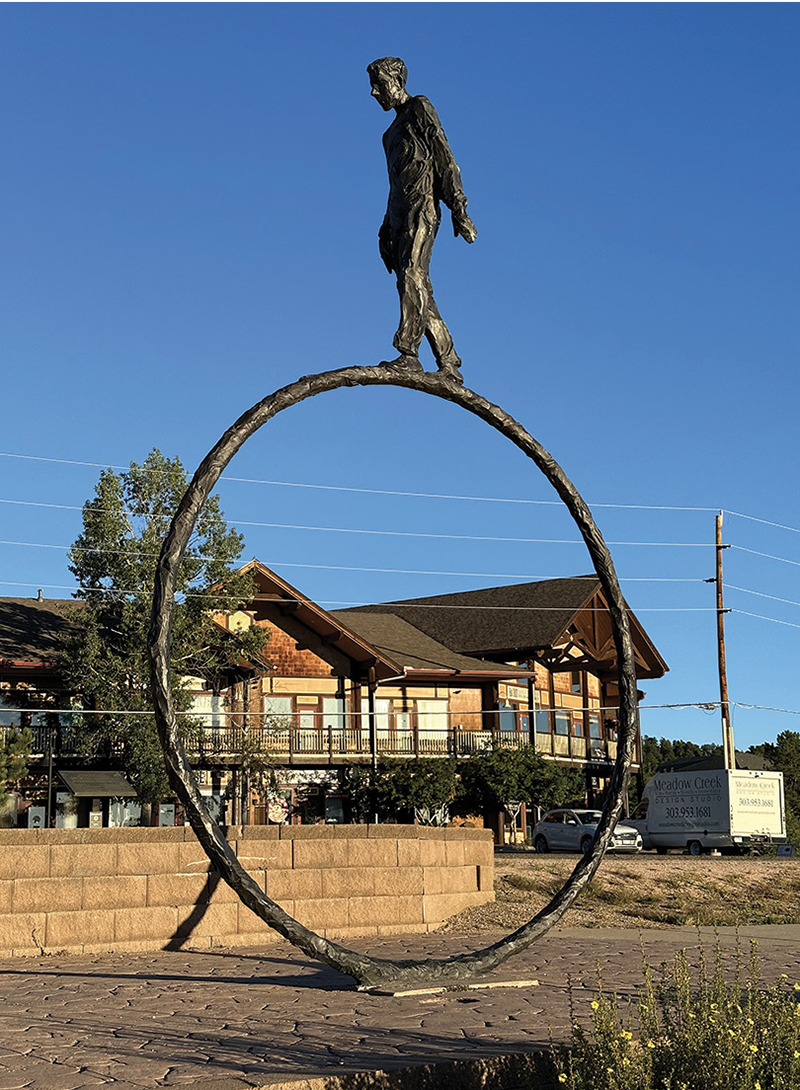
1. Located in front of Evergreen (CO) Fire Rescue Headquarters, this piece of artwork symbolizes the balance between home life and the firehouse that a volunteer firefighter must strike. (Photo by author.)
- Focus on Retention: Three Reasons Why Volunteer Firefighters Stay
- Enhancing Volunteer Firefighter Recruitment and Retention Programs Through SAFER Grant Funding
- Unmet Expectations: How New Members are Treated at a Fire/EMS Department
- The Consequences of Fire Department Mission Expansion, Part 1 | Part 2
Today’s Volunteer Firefighter
Eventually, we went from funeral homes handling first aid to the fire service taking on the task. This was before we moved all the way into paramedicine (photo 2). We began to handle hazardous materials incidents. As we did more on the rescue side, the work got more complicated and challenging. The list of responsibilities for serving the public grew. As more came along, we took it all on. All of this led to an increase in time commitment from our volunteer firefighters. And the volunteer fire service stepped up. Again.
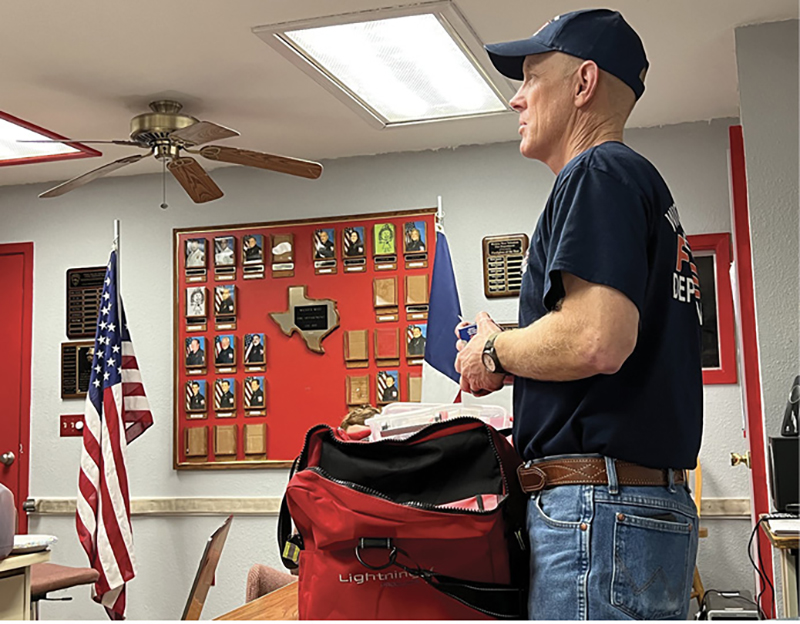
2. Wichita West Firefighter/EMT Jimmy Spears teaches an EMS drill to members. (Photos courtesy of the Wichita West Volunteer Fire Department unless otherwise noted.)
Core Values for a Life of Volunteerism
I have always considered it an honor to serve as both a volunteer and career firefighter, and very early in my career I was introduced to the steps needed to be successful in doing so. As with life in general, your core values guide you to the point where you make the right decisions. Your core values are the values you stand on. They create the foundation for everything else. We’ve all fallen in life, made poor decisions, poor choices. I’ve made mine, but falling back on what serves as my foundation, to those special areas that I grabbed hold of early on, helped to push that “reset button” and get me back to the right side of the fence. Our core values—our guiding principles—include the following:
Pride
This means ownership, not arrogance. This is my fire department, my town, my engine or ladder truck, my tools, my team. Pride goes back to the very beginning, and you can see it in the design of some early apparatus, uniforms, and insignia. Pride and ownership. A little competition goes a long way. Who doesn’t want to be part of the best (photo 3)? As Berry Gordy Jr., creator of Motown Records, put it, “Competition breeds champions.”
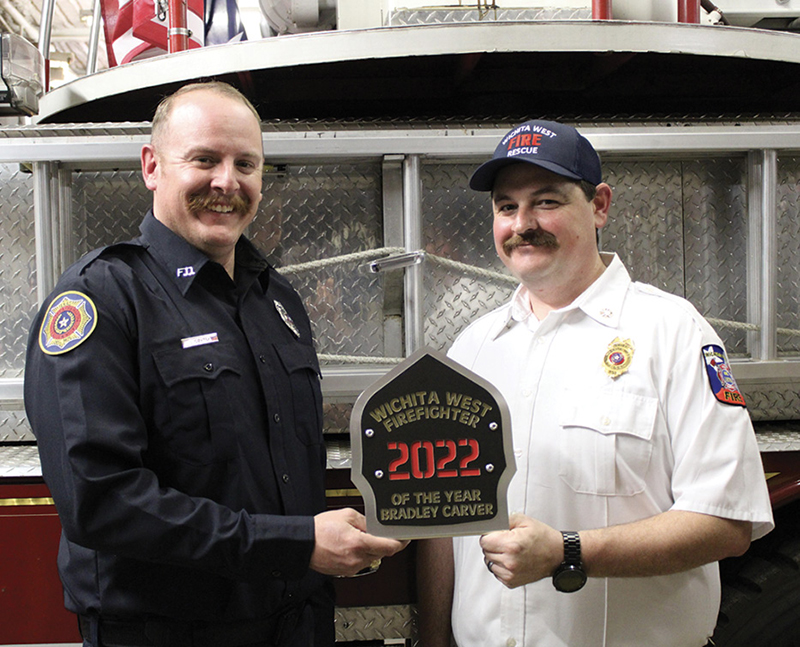
3. Chief Ryan Fetzer proudly presents the Firefighter of the Year Award to Firefighter Bradley Carver.
Honor
Understand that you are part of something bigger. Know that you must do everything in your power to protect the image of the fire service and never do anything to tarnish it. Remember, it is an honor to serve as a firefighter. Never bring shame to those who served before us. Recognize it is more than just a job, paycheck for some, or a T-shirt. There is a reason why little kids—and seniors—look up to you.
Selflessness
Recognize the importance of putting the concerns and needs of others before your own, both inside and outside the firehouse. Understand that when you sign up to be a volunteer firefighter, it’s about more than responding to the exciting calls. It’s not about picking and choosing your calls. If you’re available and can respond, then you respond. Can you imagine if someone called 911 and no one showed up? For the person calling, it is a big deal.
When I started as a volunteer firefighter a long time ago, I remember my chief handing me a home emergency alerting radio receiver. “Lasky, I’m going to make this easy on you,” he said. “When you get home, plug this into the wall. It’s going to go off for three reasons. One will be for Monday night’s radio test. Two will be Thursday night, to remind everyone it’s drill night. And three will be for an actual call. Any time it goes off, if you’re available, I want you to come to the firehouse. If it’s just radio test time, come up. There’s always something that needs to be cleaned or checked at the firehouse. If it’s for drill night, come up; you should be attending drill at the firehouse. And if it’s a call, get up here as quickly as you can.” He didn’t say, “If it goes off, sit back and listen and see if it’s an exciting call.”
Commitment
Understand the need to commit to the tradition of being a firefighter. Recognize that you’re committing to being the best you can be. We only have one chance to get it right, and we are in a serious business. Know that training, learning, and skill building are the backbone behind our successes. We commit to a way of life that requires a constant fine-tuning process. Remember that you need to read something about this profession every day. Watch the videos, show up for training, and stay dialed in and up to date (photo 4).
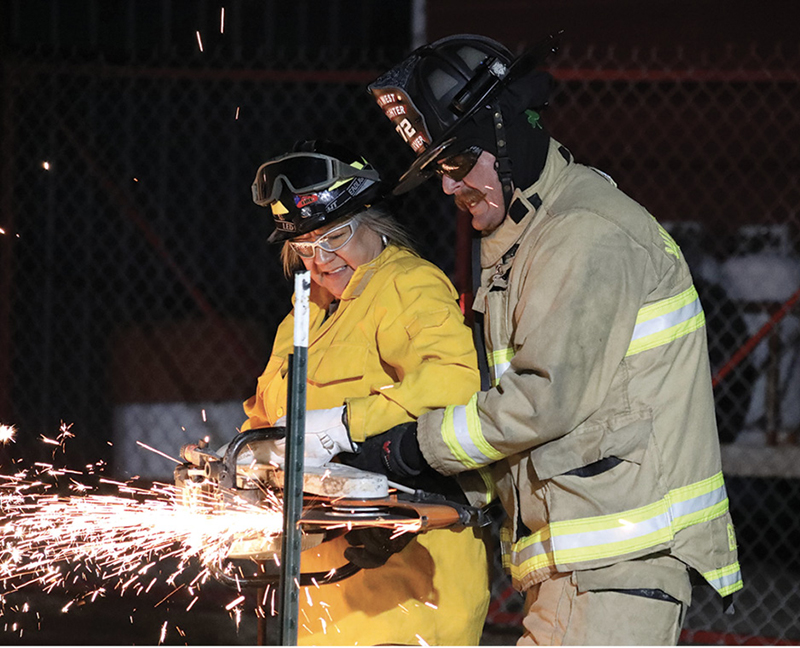
4. Firefighter Laura Walker fine tunes her metal-cutting saw skills during an “all saws” training night.
Passion
Passion drives success. No one wants to be just OK. Everyone wants to be part of something special. If you don’t love what you do, forget about being great at it. I won’t even give you “very good.” If you don’t love what you do, you’re just OK. You must love what you do or settle for being mediocre. And firefighters hate being mediocre!
Integrity
This principle serves as the bedrock beneath our foundation of core values. We are nothing without integrity, and no core value carries more weight in life. We are the integrity people. We have keys to all the businesses in town. We are in people’s homes when they aren’t home, or we push them out onto the street when we are at their home for a call. We take care of them, their belongings, and their loved ones as if they were our own. People who lack integrity cannot do that. It’s that simple.
Serving as a volunteer firefighter truly takes dedicating yourself to a certain lifestyle. And it takes someone special. Tom Merrill does a great job of describing a volunteer firefighter in his book The Professional Volunteer Fire Department. If you’re a volunteer firefighter and are not fired up about what you do after reading it, then you’re missing something (photo 5).
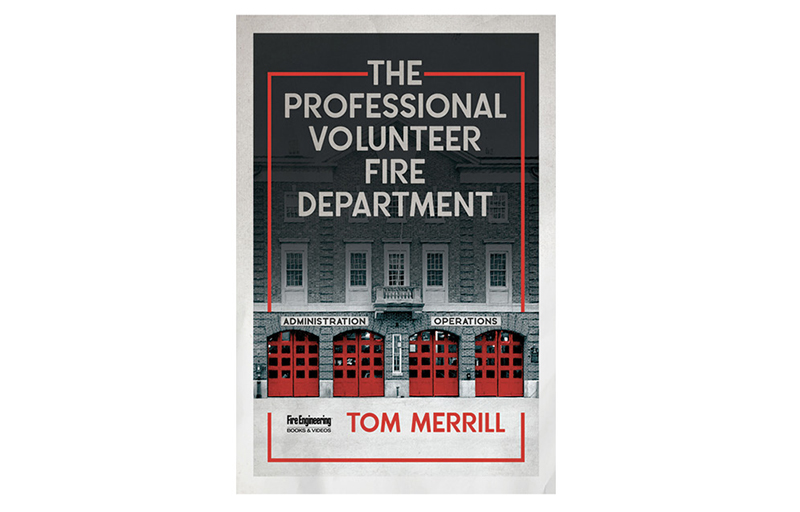
5. The Professional Volunteer Fire Department, by Tom Merrill. (Photo courtesy of Fire Engineering Books.)
The Human Factor
We’ve said for years that great leaders remember where they came from. This is especially true for those running their volunteer fire departments (photo 6). Volunteer firefighters have competing demands for their time. Good chiefs, good trustees, and commissioners realize that. They know they have volunteers working two jobs as they try to put food on the table; get money into a college fund; and make their kids’ recitals, soccer games, and many other commitments. And they still get themselves to their department’s meeting nights, drill nights, fundraisers, and more.
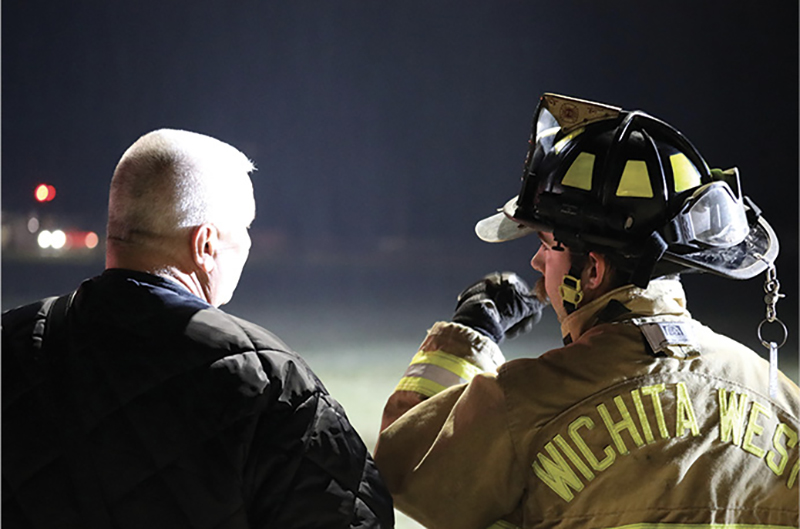
6. Having your more senior members mentor and train the next generation, your future all-stars, is crucial to your fire department’s future.
It takes someone very special to be a volunteer firefighter. And those who run the show need to remember the human factor that plays an important role in their volunteers’ lives. They must remember that call numbers and attendance will ebb and flow depending on what’s going on in the lives of their people. This is the human side of what we do. And, at times, those who are setting the parameters regarding certifications for volunteers need to understand the time commitment that volunteers make to serving in the first place.
Yes, we need to be as professional as we can, which Tom Merrill reminds us all the time. But we need a balance that allows a volunteer firefighter to stay committed to the first family (the one at home) and the second family (the one at the firehouse). The human factor.
If we truly want to address the many challenges of recruitment and retention in today’s volunteer fire service, then we must stay cognizant of the needs of our volunteers. Help them strike that balance between the firehouse and home. You can be fair and professional at the same time. Volunteer firefighters are some of the most dedicated people I know. They will do pretty much anything you ask them to do. Recognizing that dedication and remembering what it takes to volunteer will go a long way in building a strong volunteer firefighter roster.
REFERENCES
Merrill, Tom, The Professional Volunteer Fire Department, Fire Engineering Books, 2023. bit.ly/3Uct2O0.
“Union Fire Company,” Benjamin Franklin Historical Society. bit.ly/49WXYro.
Rick Lasky, a 40-plus-year veteran of the fire service, is chief of the Estes Valley (CO) Fire Protection District. Throughout his career, he has served as both a career and volunteer firefighter. He served as the co-lead instructor for the H.O.T. Firefighter Survival program at FDIC for more than 10 years, is a long-standing editorial advisory board member for Fire Engineering, and also serves on the FDIC advisory board. He is the author of the best-selling books Pride & Ownership: A Firefighter’s Love of the Job and Five Alarm Leadership: From the Firehouse to the Fireground, published by Fire Engineering Books. He is also the cohost of the podcast The Command Post, heard on FireEngineering.com, as well as the podcast Old School. In 2017, Lasky received the Tom Brennan Lifetime Achievement Award at FDIC.

